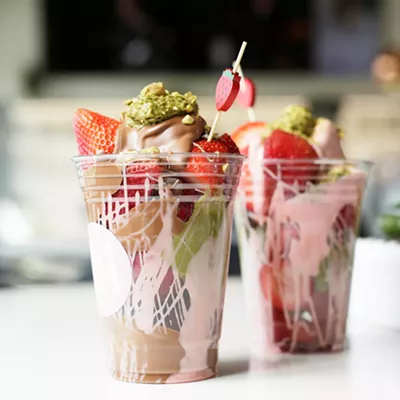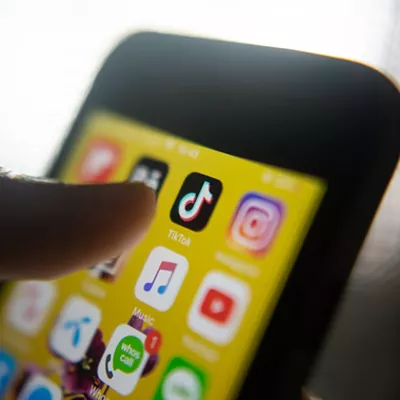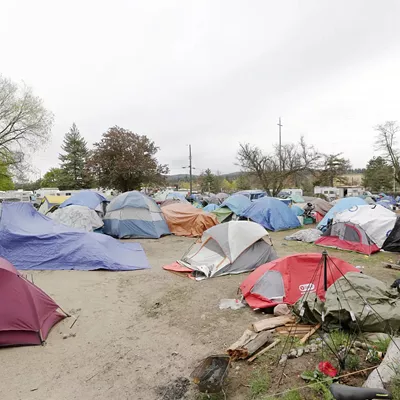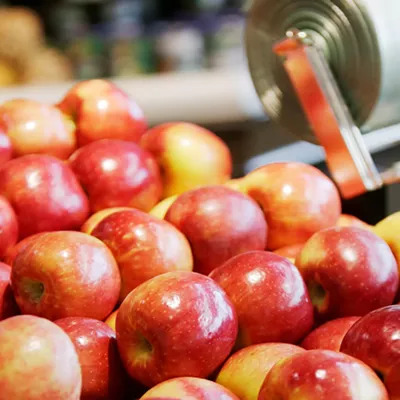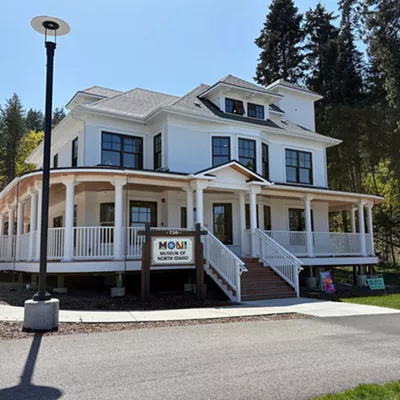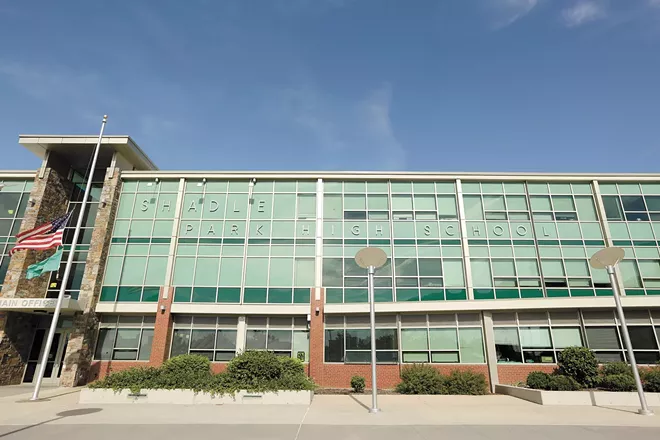
The first thing Ayden Franklin noticed when he walked into the boys' bathroom in the basement of Lewis and Clark High School on Friday was that all the mirrors were missing. They'd been taken completely off the walls.
And then, the 18-year-old senior says, he heard the toilet flush. Once, then again. He spotted kids stuffing paper towels into the toilet and repeatedly flushing it.
Bathrooms, of course, have been vandalized since the invention of indoor plumbing. It's the other kid — the dude standing just outside the stall filming his buddies — that's a clue that something is amiss.
Franklin is an Eagle Scout, but he didn't need to be one to know exactly what's going on.
"I know this is the #DeviousLicks challenge," Franklin says. He's speaking the ever-shifting lingo of TikTok, the short-video smartphone app that within a few years has come to dominate adolescent social media. Bathroom vandalism is all the rage.
It's not just the bathrooms at Lewis and Clark. Multiple restrooms get hit at Shadle Park High School a few miles away.
"Stuff gets ripped off the walls and then dumped in the toilets and the urinals, and then those flood," says Shadle Park High School Principal Chris Dunn. Paper towel dispensers are stolen. Soap dispensers are torn from their moorings, soap strewn across the floor.
It's happening at North Central High School too, and high schools in Coeur d'Alene, California and Michigan.
It all starts with one kid: On Sept. 1, a TikTok user swipes a package of disposable masks from his school, tapes himself taking them out of his backpack and then uploads the video to TikTok, describing it as an "absolutely devious lick." It's funny, precisely because the "lick" — hip-hop slang for a particularly lucrative heist — is so petty.
A few days later, another TikToker films himself showing off his own ill-gotten gains — his school's bathroom soap dispenser — and quickly racks up millions of views.
And then other videos of other purported thefts appear: a microscope, Chromebooks and more. It becomes a TikTok "challenge." Even as it mutates from larceny to vandalism, almost all of it is concentrated on school restrooms. Students get arrested in Kentucky and Florida.
And of course, this had to happen now: On top of school cafeteria supply chain hiccups and COVID outbreaks, on top of bus driver and substitute teacher shortages, on top of the culture wars over vaccine mandates and critical race theory, as anti-maskers bang on doors and scream at cops at school board meetings — now even the bathrooms themselves are under siege?
"THOUSANDS of dollars of damage done to restrooms," an exhausted Nampa, Idaho, teacher lamented in a Facebook post shared by Idaho Public Television's Melissa Davlin. "I am talking about sinks pulled out of the wall and pipes destroyed."
It's enough to make Franklin — an avid TikTok fan himself — marvel at how much the world has changed in just the last four years.
When he was a freshman, Franklin remembers, some kid unscrewed a bench in the hall and dragged it into the boy's restroom. It was the sort of prank that got shared with self-erasing messages, not broadcast to the whole universe.
"In the past when there was mischief, they'd post it on Snapchat," Franklin says. "It wouldn't be national."
KIDS THESE DAYS
Dunn, the Shadle Park principal, graduated from the school himself back in 2006, a year after YouTube launched and a year before Steve Jobs revealed the first iPhone. Today, he knows the pressure is continuous and unrelenting."That feeling of being on and being seen and kind of being vulnerable at all times through that, that's a reality," Dunn says.
University of Washington developmental psychology professor Lucía Magis-Weinberg researches the impact of social media on adolescent brain development. The impact isn't all negative, she stresses. Imagine if the pandemic had happened before social media, when isolation was truly isolating.
"Social media has been a lifeline to stay in contact with other people, to building friendships," Magis-Weinberg says.
If Zoom is the Zoomer hell of the pandemic era — imprisoned in your little box, listening to your teacher drone on and on — TikTok is Zoomer heaven, a never-ending free-association carousel of wonders. It's goofy lip-syncing and awkward dancing and musicians harmonizing with singing cats; fashion montages and conspiracy theories and activist rants; celebrities who become regular people, and regular-people who become celebrities.
And for marginalized youth and for minority youth, Magis-Weinberg says, the infinite reach of social media means they "can find like-minded peers with similar interests."
It's called the "long tail." The internet is so vast that anyone — no matter how strange, no matter how isolated — can find someone like them. So it's appropriate that the title of the front page of TikTok, with its bottomless feed of algorithmically curated videoclips, is called "For You."
But the long tail has a dark side: There are 41 million teens and tweens in America. Imagine daring every single one of them to do something dumb in front of, tantalizingly, "an infinite audience."
"You know that doing risky things will get more traction, get more views, get more engagement," Magis-Weinberg says, "We know that in the heat of the moment, adolescents struggle to think in the longer term."
Some are perfectly primed for anyone to dare them to be stupid. Last year's "Nutmeg Challenge" — which dared users to chug down the spice — sent hallucinating teens to the hospital. A 15-year-old girl died after swallowing a massive amount of anti-allergy medication as part of the "Benadryl Challenge."
Just one month before the #DeviousLicks phenomenon, the "Milk Crate Challenge" convinced scores of TikTokers to ascend an ad hoc staircase made of teetering crates — up, up, up, all the way to the emergency room.
TikTok banned the milk crate challenge hashtag. On Sept. 15, TikTok started banning the #DeviousLicks hashtag too.
"Please be kind to your schools & teachers," the official TikTok Communications Twitter account pleaded in their announcement.
When TikTok banned the milk crate challenge hashtag, Franklin says the phenomenon seemed to just disappear instantly. But #DeviousLicks has been "harder to get rid off," he adds.
North Central High School, for example, was only hit with the wave of bathroom vandalism last Thursday, two weeks after the tag was banned.
"You don't even need to post a hashtag on your TikTok for it to go on the 'For You' page," he says.
The algorithm is smart enough — or devious enough — to get around a simple hashtag ban.
A STAR IS BORN
For his part, Franklin sees a simple motive for the devious and dangerous behavior of some TikTokers: fame. TikTok offers a new route to a kind of popularity that plenty of high schoolers crave, beyond athleticism or beauty or traditional talent."I've heard kids, they sit there, and that's like their big dream," Franklin says. Become "TikTok famous."

Franklin can tell you about Charli and Dixie D'Amelio, the two girls who parceled their phenomenal TikTok success into their own Hulu show. He can tell you stories about, say, a friend who shaved her head and her hair grew back blonde and curly, and she got tens of thousands of followers because of it.
And he can even talk about the thrill of his own mild brush with TikTok fame, like when three of his TikTok comments got liked by socialite Paris Hilton.
"All these kids were like, 'Wow, that is so cool!' And it started spreading through the school," Franklin says, "Look, Ayden got his comments liked by Paris Hilton."
You may have had a nebulous idea of how popular you were in high school, Magis-Weinberg says, but these kids have actual data metrics to measure it.
"Now you can actually quantify that," she says. "Whether you've got 213 likes and whether I got 209, I can see, well, what did you do in your account to get those extra likes?"
And there's an easier way than truly doing something stupid and risky to get those likes: lie.
When a reporter from Curbed dug further into the #DeviousLicks trend, he found that a lot of the apparent criminal activity — like the supposedly stolen microscope and Chromebooks — were kids pretending to steal things they already owned.
When talking about all the crazy things that have happened because of #DeviousLicks, Franklin brings up a particularly wild claim: "Kids ended up, for the #DeviousLicks challenge, taking their principal hostage."
Indeed, in mid-September, a North Dakota TikToker posted a video that includes swarm of law enforcement and military vehicles outside a high school in Fargo, before he claims that "the principal of this school was held hostage with the bag over his head and tied to the chair."
A spokeswoman for the Fargo school district confirms to the Inlander, that no, of course a principal hadn't been kidnapped for a TikTok meme. All the emergency vehicles in the footage were only there for a "National Freedom Flag" ceremony for the 20th anniversary of 9/11.
"So someone probably wanted to say that for views," Franklin texts.
The single minute-long video racked up 2.3 million views for the hoaxer, and several low-quality content mill websites repeated the claims.
Fads fade, Franklin points out. Memes burn out. But, inevitably, new ones rise from the ashes.
At Spokane Public Schools, they're bracing for a potential second wave of DeviousLicks deviancy.
"The October challenge is to 'smack a teacher,'" North Central High School Principal Tami McCracken warned in a newsletter Friday. "Please help your student understand the seriousness of this behavior." ♦



